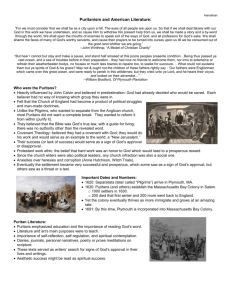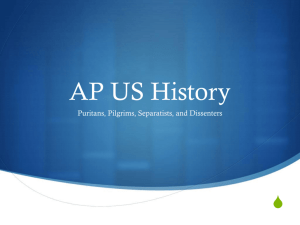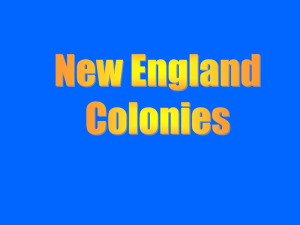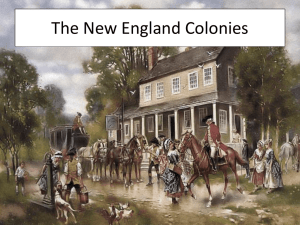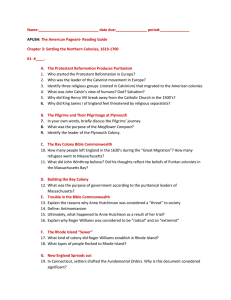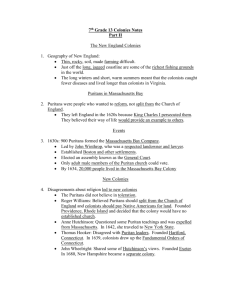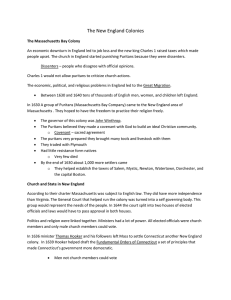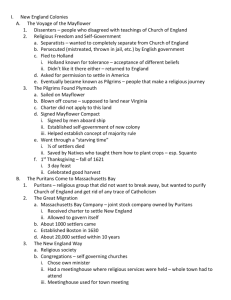Chapter 1
advertisement
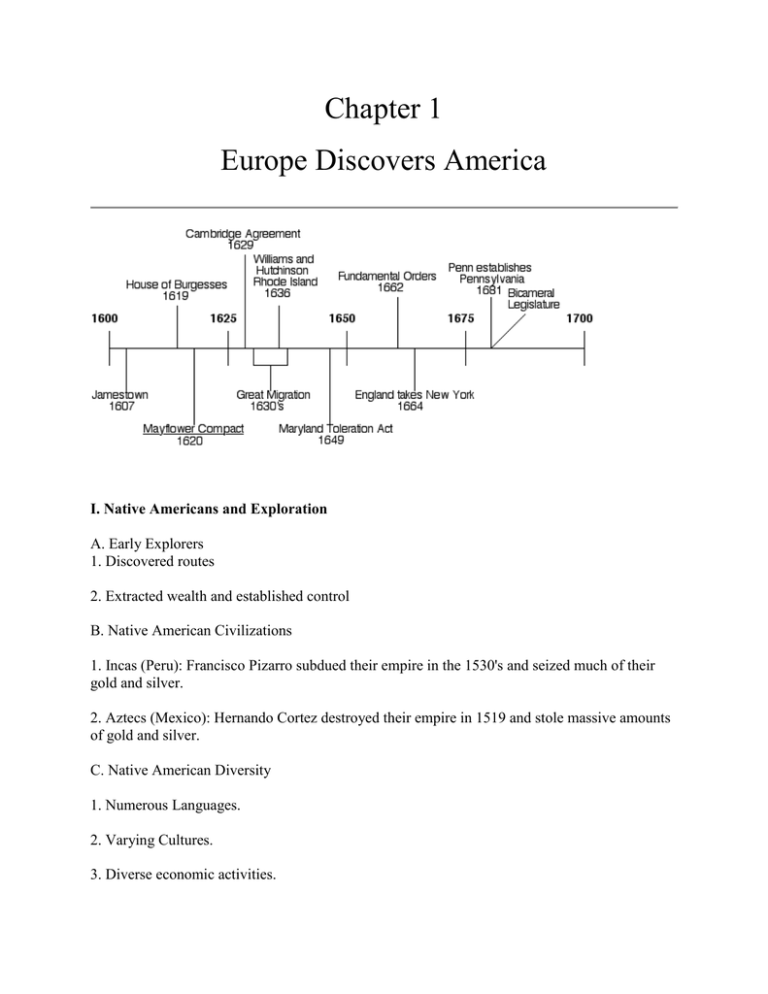
Chapter 1 Europe Discovers America I. Native Americans and Exploration A. Early Explorers 1. Discovered routes 2. Extracted wealth and established control B. Native American Civilizations 1. Incas (Peru): Francisco Pizarro subdued their empire in the 1530's and seized much of their gold and silver. 2. Aztecs (Mexico): Hernando Cortez destroyed their empire in 1519 and stole massive amounts of gold and silver. C. Native American Diversity 1. Numerous Languages. 2. Varying Cultures. 3. Diverse economic activities. 4. Different religions. E. Conflict of Cultures 1. Europeans introduced contagious, usually fatal diseases to which Native Americans had no biological resistance, such as small pox and measles. 2. Native Americans worked within ecosystems while Anglo-Europeans generally sought modification and domination. II. Spain's Dominance A. Spain was aggressive in the New World 1. Promoted Catholic indoctrination of Native Americans. 2. Grew wealthy from riches of new territories. B. Spain was more stable at the beginning of the 16th century than England and France, both of which were torn in political and religious controversy. III. Europe's Protestant Reformation A. Corruption within the Catholic Church. B. Martin Luther (Germany; 1517) 1. His objection to corrupt manner of promoting and selling indulgences acted as an immediate cause of the Reformation. 2. Lutheran Church eventually spread through much of northern Europe. B. John Calvin (France; 1534)- His doctrine of predestination greatly influenced development of later Puritan colonies. C. Henry VIII (England; c.1530)- Established Anglican Church (Chuch of England), which was similar in substance to Catholic, with the exception that hierarchy culminated with king rather than pope. IV. English Beginnings in North America; Competition with Spain A. Economic ventures- Not sponsored by the crown 1. Joint-Stock Companies- Investor-based 2. Attempts to discover passages to Orient B. Exploration, mercantilism, and colonialism 1. Sir Francis Drake--Privateer (a pirate), explorer, covert agent of the English crown 2. Sir Walter Raleigh discovered Virginia and established Roanoke C. Business interests are primary motivations behind English development, evidencing early support for capitalism; these biases are unfortunate as they do not parallel national interests. V. Settlement of Virginia A. London Company in the South; Plymouth Company in the North B. First settlement: 1607 Chesapeake Bay area was settled; Jamestown C. Strong commercial interest and motivated by profit--gold, silver, copper D. Poor choice of locations and ill-prepared settlers resulted in disaster E. John Smith tried to remedy the poor planning of the colony's activities. He had a huge impact but left after two years. F. Huge attrition (death) rates: 6,000 to 1,300 from 1606-1622 G. Conflicts with Native Americans H. John Rolfe established the tobacco industry in the Virginia colony. I. 1619 House of Burgesses- early democratic institution in Virginian government J. Sociologists suggest that the Virginia Co. was destined to fold due to lack of labor motivation until special privileges of representation and extensions of economic freedom VI. "Purifying" the Church of England A. Puritans objected to the resemblances of their church to Catholicism, especially regarding the wealth held by the church. B. Early Puritans were interested in extension of religion to ordinary worshippers C. Conflict with Anglican Church stems from the Puritan's acceptance of predestination D. Puritans had two views 1. Congregationalist--no structure beyond local congregation 2. Presbyterians--some hierarchy and centralized organization but only by the laity, not the clergy. VII. "Of Plymouth Plantation" A. Settled by Separatists (divided from Anglican Church) that fled as Pilgrims to Hudson River area. B. Supported by the London Virginia Co., 100 settlers left in 1620 on the Mayflower. C. In December, the Pilgrims landed outside of the London Co. jurisdiction and wrote the Mayflower Compact of 1621 (concept of rules to govern people similar to USA's Declaration of Independence). D. William Bradford led original settlers, half of whom died in the first year. Survivors were eventually assisted by Native American Squanto. E. Bradford's group remained small but was successful due to hard work and conviction. VIII. Puritan Commonwealth A. Land grant (later Massachusetts Bay Colony) from Plymouth Co. to Dorchester Puritans B. Great Migration of 1630s-persecution of Puritans by other settlers in their home area, resulted in demographic change C. John Winthrop's "City on the Hill" (conception of a utopian society) D. Cambridge Agreement of 1629-Charter that gave self-government to Mass. Bay Co.-created a general court and legislator, but not purely democratic E. Enough flexibility to start new churches and communities, had restrictions F. Increased membership of churches and early easy land membership requirements caused shifts in demographics. IX. Troublemakers (Dissenters) A. Roger Williams, an extreme separatist from Salem Mass., favored buying land from Native Americans, was opposed to the Anglican Church and therefore to England, strong believer in separation of church and state. 1. Economic pressure from other commonwealth members drove Williams to Rhode Island, where he received a charter and created a community with separation of church and state, toleration of all religions, and an agreement with Native Americans. B. Anne Hutchinson was popular but banished from Boston in 1637 due to her view of predestination negating necessity of morally pure lives; she contended that people could even violate laws like Antinomies (those who violate laws that are seen as unjust). Such views were considered heretical in some parts of Europe. C. A clear lack of toleration in Mass. Bay Co. exhibited toward dissenters, this combined with an early abundance of land led to demographic change and diversity. X. Other New England Colonies A. Thomas Hooker moved to Dutch lands at Hartford and drafted Fundamental Orders, 1662, a constitution of self-government chartered B. John Davenport of New Haven only let church members have input in the government. XI. French and Dutch Settlements in the Middle Colonies A. French in the St. Lawrence River area B. Dutch in the Hudson River Valley were great traders due to their domination of sea trade and interior trade posts. They also traded with the Native Americans for furs. C. Dutch also terrorized Spanish galleons D. Dutch West Indies Co. incorporated the Patron System; in an attempt to promote large- scale agriculture, large land grants were given to wealthy men who brought tenant farmers. XII. Maryland and the Carolinas A. Instead of corporate ventures, individuals or partners gained charters B. George Calvert (Lord Baltimore), a Catholic, received a charter and passed the Maryland Toleration Act of 1649 (allowed freedom of worship and created a refuge for Christians in Maryland). C. Maryland was initially to be feudal in nature, but was modified to have political and economic freedom in order to attract settlers. D. After 1660, when monarchy was reestablished in England, granting charters and land in colonies eased with a dramatic increase in land acquisition, religious toleration, and political rights. E. Carolinas influenced by John Locke drafted the Fundamental Constitution, but it was complicated and too feudal. Two charters were created in Charleston and Albermarle, later separated into North and South Carolina. XIII. The Middle Colonies A. In 1664 English interests claimed Dutch holdings and easily captured New York. B. Dutch gave New Jersey to two Quakers and promoted religious freedom, easy land terms, and political democracy at local levels. Concession through Agreements of 1677 granted trial by jury, democratic elections, and various civil rights. C. Quakers were passive and heavily religious, believed that ministers were unnecessary; they were tolerant, but unbending to opposition and looked to their inner light for understanding. D. Quakerism grew dramatically in Pennsylvania, also called William Penn's Holy Experiment. Penn was given the land in payment for a war debt owed to his father. 1. Penn dealt with Native Americans, established numerous freedoms such as a bicameral legislature, and advertising led to a huge population increase. 2. Penn was swindled by land agents that led to his being imprisoned in 1701, where he died seventeen years later. XIV. Native Americans and Europeans as "Americanizers" A. Colonists adapted and used Native American ideas and technologies; Native Americans adapted and used colonial ideas and technologies. 1. The resultant hybrid was heavily biased to the Anglo-European view. Key Terms/People/Events Martin Luther- established Lutheranism through Protestant Reformation John Calvin- established Calvinism, rejected authority of the Roman Catholic Church and stressed predestination of every person (Puritanism) Predestination- Religious philosophy that said every person was destined either for "grace in harmony with God or damnation in separation from him" Puritans- Religious dissenters that followed the beliefs of Calvinism and objected to the Anglican Church Henry VIII- King of England that established the Anglican Church Adam Smith- Smith was the Father of Modern Economies. He was against mercantilism and, in his book, The Wealth of Nations, Smith advocated a laissez-faire policy of leaving business alone. Jamestown 1607- It was established by John Smith and was the first permanent English settlement in the New World. Jamestown was located along the banks of the James River, Virginia, and was named in honor of King James I. John Smith- He was a young adventurer who led and saved the Jamestown colony in 1608. He provided leadership as a member of the governing council and his return to England resulted in a starvation period for the colonists. John Rolfe- He saved the economy of Virginia by perfecting the methods of raising and curing tobacco in 1616. Mayflower Compact (1620)- This was an agreement signed by 41 adult males before the landing at Plymouth by the Separatists. This compact made all settlers consent to be ruled by the majority's will. William Bradford- He was the first elected governor of the Plymouth colony and served for 30 years in this position. He wrote William Bradford's History of Plymouth Plantation in 1646. Massachusetts Bay Colony- In the 1630's, the Puritans colonized Massachusetts in present-day Boston. They did not want to "separate" from the Anglican Church, but instead they wanted to "purify" it of any remaining Roman Catholic origin. Puritanism was considered a Congregational Religion because all males had a say in government affairs. Great Migration- Between 1630 and 1640, a large migration of Puritans to the Massachusetts Colony took place. The vigorous persecution by King Charles I of religious dissenters brought 25,000 Puritans to America. John Winthrop- He led 1,000 Puritans to America in 1630 and was elected governor of the Massachusetts Bay Colony. He also wrote The History of New England in 1649. Cambridge Agreement (1629)- This bound John Winthrop and fellow Puritans to migrate to America if the British government allowed them to keep a charter which gave the Puritans virtual self government. Roger Williams (Rhode Island)- Roger Williams, a minister, was banished from the Massachusetts Bay Colony in 1635 because he stated that the government had no authority over the personal opinions of individuals. in 1636, he founded Rhode Island, a colony with religious freedom, and established the first Baptist church in America. Anne Hutchinson- She attacked the authority of the clergy in the Massachusetts Bay Colony by stating that they were not part of the elect. She was banished to Rhode Island in 1637 when she claimed to have spoken with the Holy Spirit. Fundamental Orders of Connecticut (1639)- Set up in Connecticut, this was the first constitution in the colonies. It enumerated the government's powers and allowed the men to vote for the governor. Patroon System- The Dutch West India Company tried to attract settlers to the New Netherlands by granting large estates to wealthy men who promise to bring a certain number of tenant farmers. This system failed because only one patroonship was established. Maryland Toleration Act (1649)- This act allowed freedom of worship for all Christians in Maryland to keep the peace between Protestants and Catholics. John Locke- He was an English philosopher of the Enlightenment whose treatise stated that "a government is created by the people for the people." Locke's writings helped establish the mindframe of democracy. Quakers- Pacifists who believe that individuals deserve recognition for their spiritual state. They swear allegiance to God and "quake" under deep religious emotion. William Penn- Penn was attracted to the Quaker faith in 1660. His father disapproved of his religious choice and sent him to the New World, where in 1681 he set up a religious asylum in Pennsylvania for Quakers. Although Pennsylvania was created for Quakers, others were invited to live there freely.
